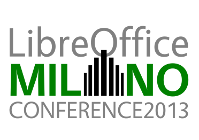Call for papers announced for LibreOffice Conference 2013
 At the end of last week, The Document Foundation blog announced the call for papers for the 2013 LibreOffice Conference, which will be held from 25th to 27th September at the Department of Computer Science of Milan State University in Italy.
At the end of last week, The Document Foundation blog announced the call for papers for the 2013 LibreOffice Conference, which will be held from 25th to 27th September at the Department of Computer Science of Milan State University in Italy.
The Document Foundation is inviting members and volunteers to submit proposals for papers and wants to hear from people, whether they are seasoned presenter or just have something interesting to share about LibreOffice.
The Call for Papers page is available at: http://conference.libreoffice.org/2013/en/call-for-papers.
Proposals should be submitted by 4th August 2013 to guarantee their consideration for inclusion in the conference programme. Detailed instructions on how to file proposals are available at: http://conference.libreoffice.org/2012/archive/support-information. These instructions should be followed carefully.
The conference programme will be based on the following tracks:
- Open Document Format (ODF);
- Interoperability;
- LibreOffice – Development and the future: Technology, API, Extensions;
- Community Track: Localisation, Documentation, etc.;
- Best Practice and Migration: Certification and Support;
- Migrating to LibreOffice in governments and enterprises;
- Building a successful business around LibreOffice.
Presentations, case studies and technical talks will discuss a subject in depth and be 30-45 minutes long (including Q&A). Lightning talks will cover a specific topic and will last 20 minutes (including Q&A). Workshops and panels will last longer (but should not exceed 90 minutes) and will discuss a topic or an issue. Sessions will be streamed live and recorded for download.
 MIMO, the French inter-ministerial group devoted to the promotion of open source within government, has become a member of the Advisory Board of
MIMO, the French inter-ministerial group devoted to the promotion of open source within government, has become a member of the Advisory Board of  The Senate and the National Assembly, the two houses of the French parliament, have agreed to make free software a priority for education,
The Senate and the National Assembly, the two houses of the French parliament, have agreed to make free software a priority for education,  The City of Genoa in Italy is now encouraging the use of free and open source software and is saving local taxpayers more than €100,000 per year,
The City of Genoa in Italy is now encouraging the use of free and open source software and is saving local taxpayers more than €100,000 per year,  With the migration from MS Office to
With the migration from MS Office to 

